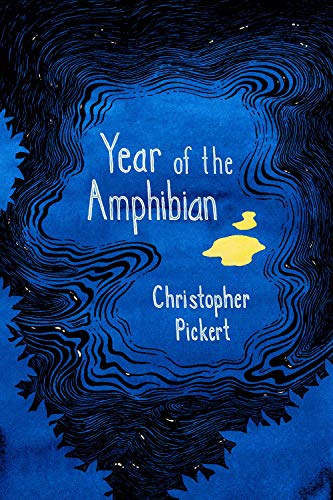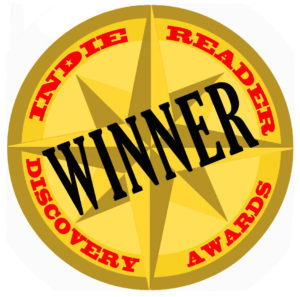Year of the Amphibian was the winner in the “Best First Book” in the Fiction category of the 2019 IndieReader Discovery Awards, where undiscovered talent meets people with the power to make a difference.
Following find an interview with author Christopher Pickert.
What is the name of the book and when was it published?
Year of the Amphibian. Published on October 8th, 2018.
What’s the book’s first line?
“I found a toad!”
What’s the book about? Give us the “pitch”.
Fourteen-year-old Conrad is sure that he doesn’t belong in dusty, concrete-covered Los Angeles, where he has to live with his mother and his cheeky little sisters. He’s starting high school in the city, even crushing on a girl there, but he longs to return to what for him is a paradise, the far-off lake in the woods where his father still lives, meanwhile not realizing how much the city has already changed him. The story follows a year of his life in the woods and the city, and shows what actually happens when he gets what he wants.
What inspired you to write the book? A particular person? An event?
I wrote what became the first chapter many years ago when I was living in northern Thailand, sometime after I found out that my dad had died. So grief was part of it, reflecting on my childhood, but that got me thinking about everything. For instance I remember wondering what had caused me to stop painting. All through middle school and high school I had seen myself as an artist and wanted to become a painter, however when I was eighteen, during a gap year before college spent living at my father’s house in Wisconsin, I had a sort of barely-expressed crisis and never painted again. But it’s one of those things that stayed a mystery to myself for a long time.
So there I was in Thailand fifteen years later, thinking about what had driven me to go there, and remembering other times my intuition had acted for me, sometimes rashly, as if my childhood confusion of identity in a split family living in different parts of the USA had rippled through the years. Writing helped me to process something, but I didn’t know where to go from that beginning. It followed me on backup discs, all the way back to Seattle, until finally I looked at it again about five years ago and knew that I had to work on it again. Which isn’t to say that it turned out exactly about what had motivated me to start it, but the feelings are definitely related. From the subject matter, some people who know my backstory have assumed that the book is simply autobiographical, but really it was built using autobiographical parts and pieces, so to speak. I also made a lot of it up.
What’s the main reason someone should really read this book?
It’s funny. Of course at its core there’s something painful, and parts still make me choke up, but there’s also much that I find hilarious, though perhaps in a dry way. Also, I think that many people will have had similar experiences. For that reason, the book is for adults as much as it is for teens.
What’s the most distinctive thing about the main character? Who-real or fictional-would you say the character reminds you of?
Conrad reminds me of myself, but this being fiction, what everybody says happens when we write fiction actually did happen: all the characters became their own people. So for me Conrad is a kind of alter-ego, following a similar but not-the-same trajectory, making different mistakes, and being mentored in ways that I wish I had been. You could call that last part distinctive: while many stories about teens happen outside the world of adults, Conrad lets himself be mentored, though not so much by his parents at first. It’s closer to what really happens in the lives of young people: they need mentors, sometimes desperately, whether they realize it or not. It’s probably a bit of wish-fulfillment on my part that Conrad gets that, when I don’t remember having it when I most needed it.
If they made your book into a movie, who would you like to see play the main character(s)?
I can’t say a particular actor, but it should be somebody who is actually around Conrad’s age, with all of the earnest awkwardness that comes with it, rather than a 20-year-old underwear model pretending to be a ninth-grader. I do think Year of the Amphibian would make a great movie, especially if it matches the close-to-the-ground feel of the story instead of being smothered by the typical Hollywood tropes. I’m allowed to hope!
Is this the first book you’ve written?
Yes, and it won’t be the last. But hopefully, now that I’ve gained some experience, the next one won’t take quite so long.
What do you do for work when you’re not writing?
Programming – I’m a developer in Seattle. I also volunteer on the board for Philharmonia Northwest, a chamber orchestra. In a previous life I taught English in Thailand and I miss being around kids, so maybe someday I’ll find my way back to that in some capacity (I might also write about that period – I have many stories).
What’s a great piece of advice that you can share with fellow indie authors?
Year of the Amphibian was my first novel, so I’ll speak to first-time writers from my experience so far. What I’m most glad about is that I listened to those who came before me and put down my drafts for extended periods. After each of those breaks, revising could feel magical (that is, once I was done tearing my hair out because my draft sucked and I sucked etc.). I hear people complain about the slog of revising, but I could have revised forever, truthfully. That’s when I figured out what I was actually doing, and by that I mean I gained a better sense of the emotional center of the story. I tried every way to come at my book sideways, hoping I could see it like a random reader would. And my intuition was always nagging me: “that part there is a missed opportunity” it would mumble (when I was in the shower, of course, or running in the woods). There’s a sea of how-to advice about publishing on the internet, but even when it’s true it’s potentially distracting if you’re still writing, as it tends to be about concrete things that are important later in the process of producing a book, such as finding editors or beta readers (not to mention the myriad technical hurdles). It risks sounding like you’re supposed to send off your first draft to an editor before the ink is dry. Worse, it glosses over revising, which I suppose is too trippy and personal to be reduced to bullets in a blog post. But when people talk about the ‘creative process’, that’s what they mean. So my advice in a nutshell is: don’t skip the creative process. Or I should say, don’t miss out on it.

